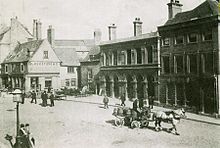
The British Rail Class 07 diesel locomotive is an off-centre cab 0-6-0 diesel-electric shunter type built by Ruston & Hornsby in 1962 for the Southern Region of British Railways. The 14 members of the class were primarily used at Southampton Docks and later also at Eastleigh Works.
MAN Diesel SE was a German manufacturer of large-bore diesel engines for marine propulsion systems and power plant applications. In 2010 it was merged with MAN Turbo to form MAN Diesel & Turbo.
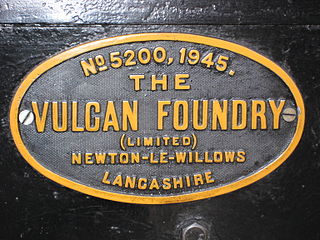
The Vulcan Foundry Limited was an English locomotive builder sited at Newton-le-Willows, Lancashire.

Ruston & Hornsby was an industrial equipment manufacturer in Lincoln, England founded in 1918. The company is best known as a manufacturer of narrow and standard gauge diesel locomotives and also of steam shovels. Other products included cars, steam locomotives and a range of internal combustion engines, and later gas turbines. It is now a subsidiary of Siemens.

The British Rail Class 43 (HST) is the TOPS classification used for the InterCity 125 High Speed Train (formerly Classes 253 and 254) diesel-electric power cars, built by British Rail Engineering Limited from 1975 to 1982, and in service in the UK since 1976.

The British Rail Class 60 is a class of Co-Co heavy freight diesel-electric locomotives built by Brush Traction. They are nicknamed Tugs by rail enthusiasts.

Richard Hornsby & Sons was an engine and machinery manufacturer in Grantham, Lincolnshire, England from 1828 until 1918. The company was a pioneer in the manufacture of the oil engine developed by Herbert Akroyd Stuart, which was marketed under the Hornsby-Akroyd name. The company developed an early track system for vehicles, selling the patent to Holt & Co. in America. In 1918, Richard Hornsby & Sons became a subsidiary of the neighbouring engineering firm Rustons of Lincoln, to create Ruston & Hornsby.
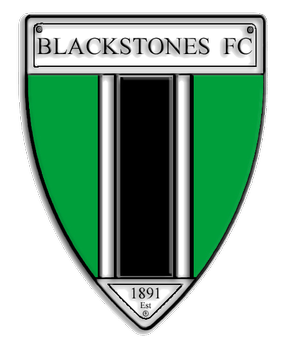
Blackstones Football Club is a football club based in Stamford, Lincolnshire, England. They are currently members of the United Counties League Division One and play at Lincoln Road. Their kit consists of Lincoln green and white shirts with black shorts and green socks.
Paxman was a major British brand of diesel engines. Ownership has changed on a number of occasions since the company's formation in 1865, and the brand is now part of MAN Energy Solutions. At its peak, the Paxman works covered 23 acres (9.3 ha) and employed over 2,000 people. Early Paxman diesel engines carried the name Paxman Ricardo.

The British Rail Class 29 were a class of 20 diesel-electric Bo-Bo locomotives produced by the re-engining of the NBL Type 2 units. The units were designed for both passenger and freight trains.

Agricultural & General Engineers Limited (AGE) was a holding company formed on 4 June 1919 during a postwar economic "boom" to combine five British engineering companies: Aveling & Porter, E H Bentall, Blackstone, Richard Garrett and J & F Howard. The holding company's business was described to the judge considering its 1932 winding up as: "agricultural, transport, road, constructional and general engineers".
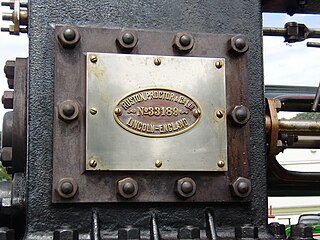
Ruston, Proctor and Company was established in Lincoln, England in 1857, and were manufacturers of steam tractors and engines. They later became Rustons and then Ruston & Hornsby.
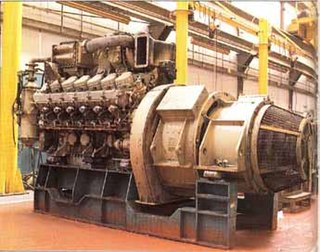
The Paxman Valenta, also known as Y3J and RP200, is a diesel fuelled internal combustion engine formerly made by Paxman in Colchester, England. It was originally developed for, and previously used in the British Rail (BR) Class 43 diesel-electric locomotives, a pair of which powered the InterCity 125 High Speed Train (HST) in a push-pull train set configuration. The Valenta has also been used for electricity generation in diesel generators on offshore oil rig platforms in British waters.
Blackstones or Blackstone's may refer to:

The Prima Diesel-electric locomotives are a class of medium and heavy, four- and six-axle, passenger and freight mainline locomotives. They have been built both to 1,435 mm standard and 1,668 mm broad gauges, and find use in the Middle East, Europe and North America. Alstom is the primary designer in cooperation with both General Motors and Siemens.

The AD43C is a type of mainline 6 axle Co'Co' diesel locomotive designed by Alstom and used by the Islamic Republic of Iran Railways (RAI). It was in production from 2000. Delivery started in 2002.
Iran Heavy Diesel Manufacturing Company(DESA), is an Iranian company which is a manufacturer of heavy diesel engines from 200 to 3500 kW for railway, marine and power generation purposes.
The RK 215 is a line of diesel engines built by MAN. The RK 215 series is a large four-stroke diesel engine that has an 11-liter displacement per cylinder.
The Paxman Hi-Dyne engine was a form of experimental diesel engine developed for rail transport use by the British engine makers Paxman of Colchester. They used variable supercharging to give a constant power output across their speed range.
